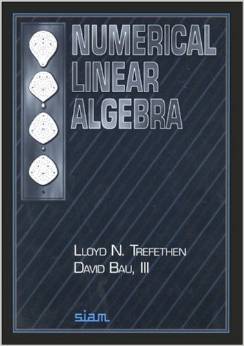MTH
451-
551
: NUMERICAL LINEAR ALGEBRA - Fall 2017
|
|
| General information |
|---|
Instructor:
Malgorzata Peszynska
(Contact information including office hours is on Instructor's website. See also
department website
)
Grader:
Mr Naveen Somasunderam; somasunn@oregonstate.edu
Class: MWF 10:00-10:50 STAG 262. Credits:3.
Prerequisites: Solid skills in real variables, and linear
algebra (MTH 341) are the prerequisites; MTH 342 and MTH 351 are
recommended. Prior computing experience is not required but students
will be expected to grow in their computational and theoretical
abilities.
(Please contact the Instructor with questions.)
Numerical Linear Algebra is the foundation of Computational and
Data Science; it provides the basis (no pun intended) for the
modern machine and deep learning, imaging science, optimization,
and the solution of large (non)linear systems of equations arising
in various applications. In this class you will learn the basic
concepts, algorithms, and you will have a chance to sample some of
the applications.
Course content:
- Numerical solution of linear systems using direct and iterative
methods, factorizations and decomposition of matrices.
- Stability and accuracy of numerical methods for linear algebra.
- Orthogonal decompositions, SVD (singular value decomposition) and
least squares, as used in imaging, optimization, and other
applications.
- Numerical methods for finding eigenvalues and eigenvectors.
- Iterative methods for solving large linear systems, with emphasis
on the positive definite systems.
Exams: There will be two exams: a midterm (in class) on Friday
October 20, and a Final Exam on Tuesday, Dec 5, at 0930. Each exam
will count as 30% of the grade.
Homework and quizzes: Homework will count as 30% of the grade
and will be assigned (almost always) weekly. The two lowest scores of
HW1...HW6, or HW 7 (counted double), will be dropped.
There will also be weekly
quizzes (usually on Fridays) which will count together as 10% of the
grade. The quizzes will be based on the material announced in class
before the quiz.
Course Learning Outcomes:
A successful student who completed MTH 451 will be able to
- Apply the basic direct and iterative methods for solving linear
systems
- Implement and justify convergence of model iterative methods for
solving linear systems
- Follow analyses of stability and accuracy of an algorithm, and
determine accuracy experimentally
- Propose an appropriate method for a given linear system
and a desired decomposition of a given matrix
A successful student who completed
MTH 551 will be able to
- Analyze, select and test selected direct and iterative methods for solving linear
systems
- Implement and analyze convergence of selected iterative methods for
solving linear systems
- Carry out analyses of stability and accuracy of an algorithm, and
determine accuracy experimentally
- Propose an appropriate method for solving a linear system or
for decomposition of a matrix of particular type.
- Carry out demonstrations of applicability of the selected
numerical linear algebra methods.

|
Textbook:
NUMERICAL LINEAR ALGEBRA
Lloyd N. Trefethen and David Bau, III
xii+361 pages; SIAM, 1997
Softcover / ISBN-13: 978-0-898713-61-9 / ISBN-10: 0-89871-361-7 /
MATLAB: there exist plenty of good resources for MATLAB, some
available online (search, for example, for "matlab tutorial
free").
|
Statement Regarding Students with Disabilities:
Accommodations for students with disabilities are determined and
approved by Disability Access Services (DAS). If you, as a student,
believe you are eligible for accommodations but have not obtained
approval please contact DAS immediately at 541-737-4098 or at
http://ds.oregonstate.edu. DAS notifies students and faculty members
of approved academic accommodations and coordinates implementation
of those accommodations. While not required, students and faculty
members are encouraged to discuss details of the implementation of
individual accommodations. The DAS Statement is posted online at:
ds.oregonstate.edu/faculty-advisors (4/14/16).
Link to Statement of Expectations for Student Conduct, i.e., cheating policies
http://oregonstate.edu/studentconduct/offenses-0
|
|
|

